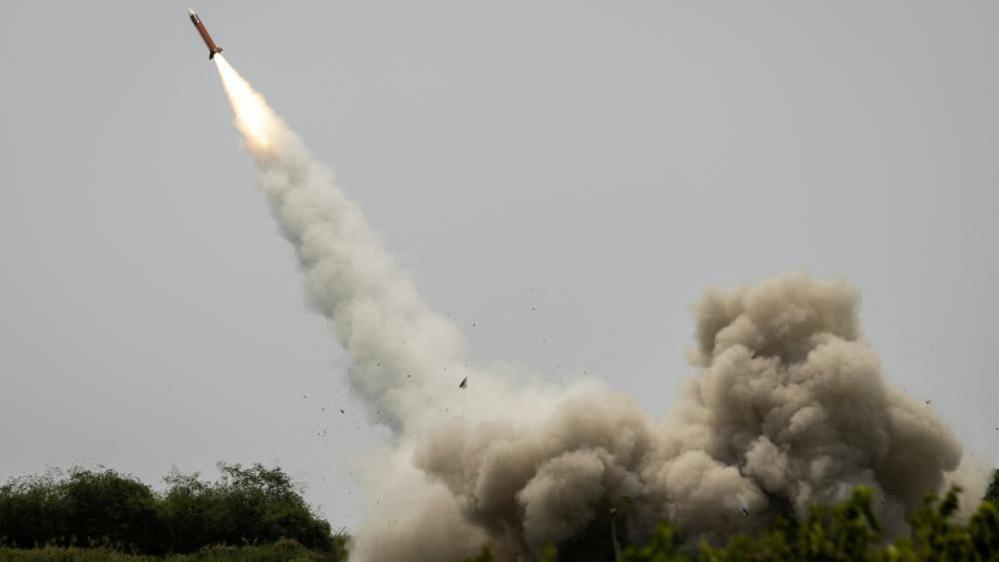Trump weapons pledge marks major step forward for Ukraine
Watch: Trump lays out Ukraine weapons deal
- Published
For the first time since returning to the White House, Donald Trump has pledged to make new weapons available to Ukraine.
Under a new deal, the US will sell weapons to Nato members who will then supply them to Kyiv as it battles Russia's invasion.
The president didn't give too many specifics about what he said was "billions of dollars' worth of military equipment". But when asked if the deal included Patriot air defence batteries and interceptor missiles, he replied "it's everything".
One European country has 17 Patriot systems and "a big portion" would soon be on the way to Ukraine, Trump said.
For Ukraine, a huge country that currently operates handful of batteries - perhaps as few as eight - this is a major step forward, giving Kyiv a chance to expand protection against Russian ballistic and cruise missiles.
Sitting beside the president, the Nato Secretary General, Mark Rutte, hinted at a bigger package.
"It's broader than Patriots," he said.
"It will mean that Ukraine can get its hands on really massive numbers of military equipment, both for air defence, but also missiles, ammunition..."
This is a significant moment.
Less than two weeks ago, there was horror in Kyiv at news that the Pentagon had suspended military shipments to Ukraine, including Patriots.
The decision-making surrounding that announcement remains unclear, but on Monday, Trump once again tried to make light of it, saying it had been made in the knowledge that this deal would be struck.
"We were pretty sure this was going to happen, so we did a little bit of a pause," the president said.
Now, thanks to some tortuous negotiations, many of them involving Rutte, the weapons can continue to flow without Washington picking up the tab.
"We're in for a lot of money," the president said, "and we just don't want to do it any more."
The deal is a personal triumph for Rutte, the "Trump whisperer", who has flattered and encouraged the president, in part by helping to secure a member-wide Nato commitment to spend 5% of GDP on defence.
As they sat side by side in the Oval Office, Rutte continued to flatter Trump, calling the latest deal "really big" and saying it was "totally logical" that European members of Nato pay for it.

Additional Patriot missile batteries will give Kyiv a chance to expand protection against Russian attacks (file pic)
A number of countries, he said, were lining up to participate, including the UK, Germany, Finland, Sweden, Norway and the Netherlands.
"And this is only the first wave," he said. "There will be more."
In a separate and rather characteristic development, Trump threatened Moscow with a new deadline: if Vladimir Putin doesn't agree to a ceasefire deal in the next 50 days, Russia and its trading partners will be hit with 100% secondary tariffs.
It's a novel approach, which Kyiv and members of the US congress have been urging for some time: pressure Russia by targeting countries that continue to buy Russian oil and gas, like China and India.
Trump's move comes as the US Senate continues to work on a bill that would impose much stiffer sanctions.
The president said the Senate bill, which envisages 500% secondary tariffs, could be "very good" but added that it was "sort of meaningless after a while because at a certain point it doesn't matter".
As always, the precise details of the president's threat remain somewhat vague.
But whatever happens in the coming weeks and months, Monday felt like something of a turning point. A US president finally moving away from his perplexing faith in Vladimir Putin, while still giving the Russian leader time to come to the negotiating table.
It's definitely not a return to Joe Biden's pledges to support Ukraine "for as long as it takes," but nor is it quite the neutral stance that has infuriated Ukraine and its western allies.
Trump appears to have guaranteed that the all-important US weapons pipeline to Ukraine will remain open for now – provided others pay for it.
But 50 days will feel like a very long time to Ukrainians, who are on the receiving end of near-nightly drone and missile bombardment.
Nothing Trump has done seems likely to put an immediate stop to this.
